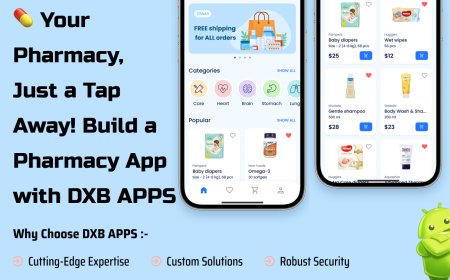Secure by Design: How Dynamics Partners Ensure Compliance and Data Protection
For organizations adopting Microsoft Dynamics 365, working with a trusted Dynamics implementation partner ensures that the solution is secure by design, not just secure by default

Introduction
In todays increasingly digital landscape, data is a core business assetand also a key risk vector. With rising cyber threats, evolving compliance mandates, and expanding customer privacy expectations, businesses deploying ERP and CRM systems must make security a top priority from day one. For organizations adopting Microsoft Dynamics 365, working with a trusted Dynamics implementation partner ensures that the solution is secure by design, not just secure by default.
Understanding Secure by Design
"Secure by design" refers to building software systems with security built into every phase of the development and deployment lifecycle. Its not an afterthought or a patchwork of solutions added later. In the context of Microsoft Dynamics 365, this means ensuring that every module, workflow, integration, and user access policy adheres to the principles of data privacy, encryption, role-based access, and regulatory complianceright from planning through to rollout.
A seasoned Dynamics implementation partner plays a crucial role in realizing this approach. These partners go beyond just technical deploymentthey are strategic advisors who integrate cybersecurity and compliance frameworks throughout the entire implementation journey.
Why Security and Compliance Matter More Than Ever
The modern enterprise faces an unprecedented combination of risks:
-
Data Breaches: Sensitive customer, employee, and business data is increasingly under threat from hackers and ransomware.
-
Regulatory Scrutiny: Laws like GDPR, HIPAA, CCPA, and SOC 2 impose stringent data handling requirements.
-
Cloud Complexity: As data flows across on-premise, hybrid, and public cloud environments, managing permissions and security configurations becomes harder.
-
Business Continuity: Even a minor security lapse can lead to reputational damage, regulatory penalties, or operational downtime.
As a result, security and compliance are not optionalthey are essential design principles. A trusted Dynamics implementation partner ensures that your solution is not only operationally robust but legally and ethically sound.
Key Ways Dynamics Partners Deliver Secure by Design Implementations
1. Compliance-Centered Planning
Before writing a single line of code or configuring any module, experienced partners perform in-depth compliance assessments. This includes:
-
Understanding your industrys regulatory environment
-
Mapping data flows across departments
-
Identifying compliance gaps in legacy systems
Based on this, they design your Dynamics 365 implementation to align with regulations like PCI-DSS for retail, HIPAA for healthcare, or GDPR for multinational operations.
For example, a Dynamics implementation partner working with a healthcare provider would ensure that patient records are encrypted, access-controlled, and audit-logged to meet HIPAA mandates.
2. Role-Based Access Control (RBAC)
One of the fundamental pillars of security in Dynamics 365 is role-based access control. Partners help define precise roles and permissions aligned to organizational hierarchy and responsibilities. This principle of least privilege ensures users can only access the data they truly needminimizing insider threats and reducing risk exposure.
The Dynamics implementation partner configures these roles during setup and tests them rigorously during User Acceptance Testing (UAT).
3. Secure Integrations with External Systems
Modern ERP and CRM systems are not siloedthey connect with finance apps, inventory tools, e-commerce platforms, HR systems, and customer support software. Every integration is a potential entry point for malicious actors if not secured.
A competent partner ensures:
-
APIs are authenticated using OAuth or other secure protocols
-
Data transmission is encrypted (e.g., HTTPS, TLS 1.2+)
-
All integration endpoints are monitored and logged
Moreover, partners validate that external systems meet the same security standards as Dynamics 365.
4. Data Encryption and Storage Best Practices
Microsoft Dynamics 365 already comes with enterprise-grade encryptionboth at rest and in transit. However, the actual implementation and governance of encryption policies require expert oversight.
A skilled Dynamics implementation partner helps businesses:
-
Implement field-level encryption for especially sensitive data like SSNs or credit card details
-
Store encryption keys securely using Azure Key Vault
-
Manage data lifecycle policies to securely archive or delete obsolete records
They also ensure data residency requirements are met, especially in jurisdictions that mandate local data storage.
5. Continuous Security Monitoring and Incident Response
Post-implementation, security is not a set it and forget it activity. Partners build ongoing monitoring into your Dynamics environment using:
-
Microsoft Defender for Cloud Apps
-
Azure Security Center
-
Custom Power BI dashboards for security analytics
Additionally, a reliable Dynamics implementation partner helps define an incident response plan, so that in the event of a breach or anomaly, there are documented steps to investigate, respond, and recover efficiently.
6. Audit Trails and Reporting for Compliance
Auditability is a key requirement for compliance in many industries. Dynamics 365 supports extensive audit logging, but partners play a key role in:
-
Configuring custom audit policies
-
Automating compliance reporting
-
Integrating audit logs with SIEM (Security Information and Event Management) tools
This is especially important for industries like finance, where maintaining an audit trail of user actions and financial transactions is mandatory.
7. User Training and Change Management
Even the most secure system can be compromised by human error. Thats why partners invest in training users on:
-
Identifying phishing emails
-
Using Multi-Factor Authentication (MFA)
-
Reporting suspicious activity
-
Following best practices for data handling
Security-conscious Dynamics implementation partners include change management as a core component of their delivery to foster a security-first culture within the organization.
Case Study Example: Dynamics 365 for a FinTech Company
A global FinTech firm working in the US and EU needed a secure Dynamics 365 implementation for managing financial client interactions and data. The chosen Dynamics implementation partner designed the solution to:
-
Enforce strict access controls with Azure Active Directory and Conditional Access Policies
-
Configure real-time alerts for unauthorized login attempts
-
Maintain compliance with both GDPR and SOX through automated reporting and data handling workflows
The result? The company passed its external compliance audit with zero security observations, gained investor confidence, and improved client trust.
Choosing the Right Dynamics Implementation Partner
Not all implementation partners are created equal. To ensure security and compliance, look for a partner who:
-
Is certified by Microsoft with relevant security competencies
-
Has experience in your industry and understands its regulatory requirements
-
Offers ongoing support and managed security services
-
Provides clear documentation and user training
Most importantly, the partner should view security as a foundational principlenot just a checklist.
Final Thoughts
Security and compliance cannot be bolted onto your Dynamics 365 deploymentthey must be woven into its very architecture. A strategic Dynamics implementation partner understands this, bringing not only technical expertise but also a deep commitment to keeping your systems secure by design.
In an era where digital trust defines customer loyalty and business success, investing in a secure implementation is not just prudentits essential.












































